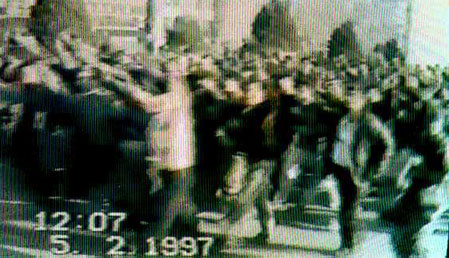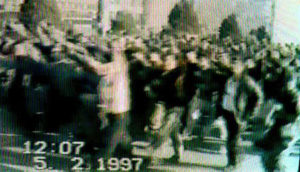PRESS RELEASE: Uyghur Congress Remembers the Victims and Calls for Action on the 22nd Anniversary of the Ghulja Massacre

Press Release – For immediate release
4 February 2019
Contact: World Uyghur Congress www.uyghurcongress.org
0049 (0) 89 5432 1999 or [email protected]

The World Uyghur Congress remember the victims of the Ghulja Massacre, on the 22nd anniversary of the incident where hundreds of Uyghurs were killed, arrested or wounded as Chinese security forces violently cracked down on peaceful Uyghur protestors. The date remains a watershed moment in terms of the treatment of Uyghurs in East Turkistan by the Chinese government, and foreshadowed the persecution that would last for years afterwards.
On February 5, 1997, thousands of Uyghurs gathered for a peaceful demonstration in the Ili prefecture city of Ghulja in East Turkistan in response to continued Chinese aggression and the prohibition of Uyghur social organizations, known as Mäshräp, from gathering for cultural events. The protests were immediately quashed by Chinese security forces leaving at least 100 dead and many more injured. Nearly 4000 would be arrested and of those, 200 would subsequently face the death penalty.
Uyghur Congress President, Dolkun Isa, said of the incident, “It’s been more than two decades and the Chinese government continues to push the Uyghur population further and further. The Ghulja Massacre was one of the first indications of the lengths to which the state would go to violently crush peaceful dissent.”
While the Chinese government had frequently cracked down on Uyghur protests, denied them their basic rights and silenced dissenting voices, the level of brutality demonstrated in the Ghulja Massacre showed a dramatic escalation in repression.
Subsequent Uyghur protests or demonstrations have been dealt with in an equally repressive and violent manner. Most notably, after demonstrations and unrest in Urumqi on July 5, 2009, Chinese security forces cracked down brutally on anyone thought to be involved. Hundreds of innocent Uyghurs were killed, arrested or simply disappeared. Human Rights Watch recorded over 40 Uyghurs were subjected to enforced disappearance by the Chinese government, although the total number of disappearances is likely over 200 people.
Since the crackdown in 2009, freedom of assembly has been virtually non-existant. Any small demonstrations that have sprung up have been quickly quashed. Similarly, freedom of expression has also been severely curtailed, leaving Uyghurs with no possibility to express legitimate grievances or to call for their rights to be respected. The Ghulja Massacre proved to be emblematic of the Chinese government’s treatment of the Uyghur people, as they saw many of their basic rights disappear entirely in the intervening years.
In this way, the Chinese government chose to disregard legitimate grievances widely voiced by the Uyghur community, rather than developing a response that would take the rights of millions seriously. In the aftermath, peaceful protests were all but snuffed out as Uyghurs became increasingly intimidated by such a use of force – a clear intention of the state.
In 2018, police and security forces have grown well accustomed to dealing with any kind of conflict strictly with force, deadly if necessary. As a perverse consequence, we have witnessed the violent suppression of Uyghur voices in public – measures that have been undoubtedly been institutionalized. Hundreds of Uyghurs have been killed over the last 22 years in an effort to maintain a firm grip on the exercise of legitimate rights.
In this context, China’s decision to arbitrarily detain more than 1 million Uyghurs in political indoctrination camps and attempts to assimilate and socially reengineer the population is part of a decades-long process of repression and coercion. The Uyghur people have witnessed their rights progressively stripped away until their very freedom, culture, religion and ethnic identity was targeted. The camps are a culmination of decades of repressive policies directed towards the Uyghur people.
Twenty-two years ago, the international community failed to adequately hold China accountable for the massacre of innocent civilians. The victims and their families have never achieved justice or accountability. Instead, the persecution of the Uyghur people has escalated beyond comprehension and the continued existence of the Uyghurs as a unique ethnic group is under threat.
On February 5th, the World Uyghur Congress therefore remembers all those who were affected and killed during the Ghulja Massacre. We must not forget all those who lost their lives simply for exercising their right to free assembly.
We urge the international community to immediately take action to close the camps and end this escalating cycle of repression. If the world does not act, the situation may continue to get worse.

